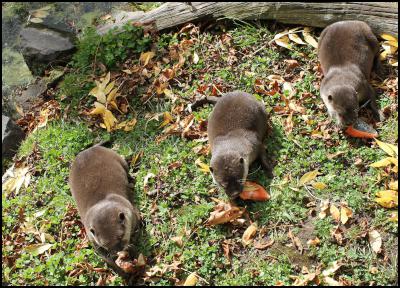Otters dose up on Omega-3s
Media release otters – 1
4 May, 2012
Otters dose up on Omega-3s

Humans aren’t the
only animals to benefit from healthy omega-3s. Willowbank
Wildlife Reserve’s otters do too.
A group of five otters at the Canterbury Reserve have been lapping up all the goodness of healthy long chain omega-3 oils after receiving a shipment of baby salmon this week.
Think improved joint mobility, heart health and glowing skin and hair – just what a fashionable otter desires.
Marlborough-based New Zealand King Salmon has donated 500kg of baby salmon (smolt) to the reserve to give the otters a healthy and tasty alternative to their everyday diet.
Head of ‘Wild NZ’ at the Reserve is Genevieve Sinnott and she says the company has frequently donated salmon smolt to the reserve - and it’s a favourite of the otters.
“Salmon smolt is always a treat for our little furry friends. Their diet is usually herring and pilchard so they jump at the chance for the variety of a more tasty fish. And of course the otter-keepers are happy to know their charges are dosing up on healthy Omega-3s at the same time,” says Genevieve.
NZ King Salmon has in the past donated a similar amount of its baby salmon to the reserve and in gratitude Willowbank is putting up a small plaque in the otter enclosure thanking the company for its support.
The Otters at Willowbank are Asian Small-Clawed. They are one of the smallest otter breeds in the world, rarely weighing more than 5kg - Willowbank’s weigh in at around 3.5kg.
They are gregarious and are often found in groups of up to 15 individuals. The Willowbank otters have unusual “hand-like” front paws that have greater sensitivity and less webbing than other otter species, because they forage for their prey of crustaceans, molluscs and fish.
Their
home habitats are the mangrove swamps and freshwater
wetlands of Bangladesh, India, China, Malaya, Indonesia,
Thailand and Vietnam where their official status is
‘vulnerable’.
ends


 FASD-CAN: People With Fetal Alcohol Spectrum Disorder (FASD) Dismayed At Government’s Response To The Rights Of Disabled People
FASD-CAN: People With Fetal Alcohol Spectrum Disorder (FASD) Dismayed At Government’s Response To The Rights Of Disabled People NZ Opera: Jane Austen Opera Coming To Christchurch & Dunedin - South Island Premiere | NZ Opera’s Mansfield Park Returns This April
NZ Opera: Jane Austen Opera Coming To Christchurch & Dunedin - South Island Premiere | NZ Opera’s Mansfield Park Returns This April Sport Manawatū: Women’s Health Series Empowers Women To Prioritise Their Wellbeing
Sport Manawatū: Women’s Health Series Empowers Women To Prioritise Their Wellbeing Pure Adventure Charitable Trust: Iconic One New Zealand GODZONE To Make Triumphant Return To New Zealand’s Adventure Racing Scene
Pure Adventure Charitable Trust: Iconic One New Zealand GODZONE To Make Triumphant Return To New Zealand’s Adventure Racing Scene The Charter School Agency: New Charter Schools Open Doors To First Students
The Charter School Agency: New Charter Schools Open Doors To First Students  The Wednesday Challenge: Tauranga Travel Initiative Goes National
The Wednesday Challenge: Tauranga Travel Initiative Goes National